Holmes Institute HI5017 Managerial Accounting Report Analysis
VerifiedAdded on 2022/09/15
|12
|4251
|26
Report
AI Summary
This report critically evaluates the use of management accounting systems in contemporary organizations by analyzing two journal articles. The analysis focuses on the application of various management accounting techniques, such as value chain analysis, balance scorecards, and total quality management, within a case company. The report assesses the relevance of these techniques to real-life companies, comparing findings from the selected articles. It explores the importance of management accounting in competitive business environments and identifies specific outcomes for management accountants. The research examines the impact of information technology integration and the extent of ABC use on the performance of manufacturing plants, highlighting the relationship between IT integration, management accounting, and business strategy. The study also explores the relevance of management accounting information at different organizational levels and the impact of strategic decisions based on external information. The report concludes by discussing the practical implications of these findings for managerial decision-making and the achievement of business goals.
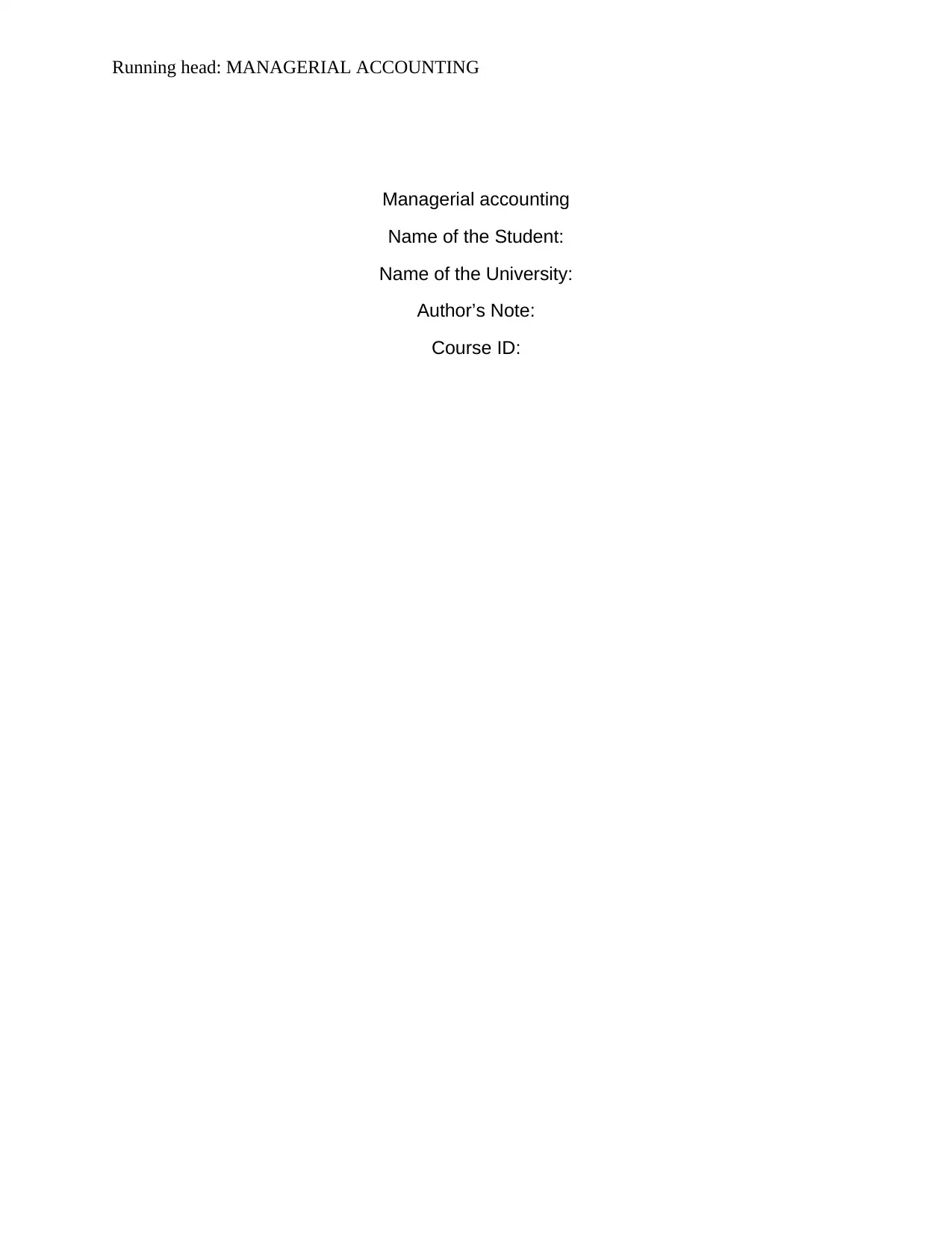
Running head: MANAGERIAL ACCOUNTING
Managerial accounting
Name of the Student:
Name of the University:
Author’s Note:
Course ID:
Managerial accounting
Name of the Student:
Name of the University:
Author’s Note:
Course ID:
Paraphrase This Document
Need a fresh take? Get an instant paraphrase of this document with our AI Paraphraser
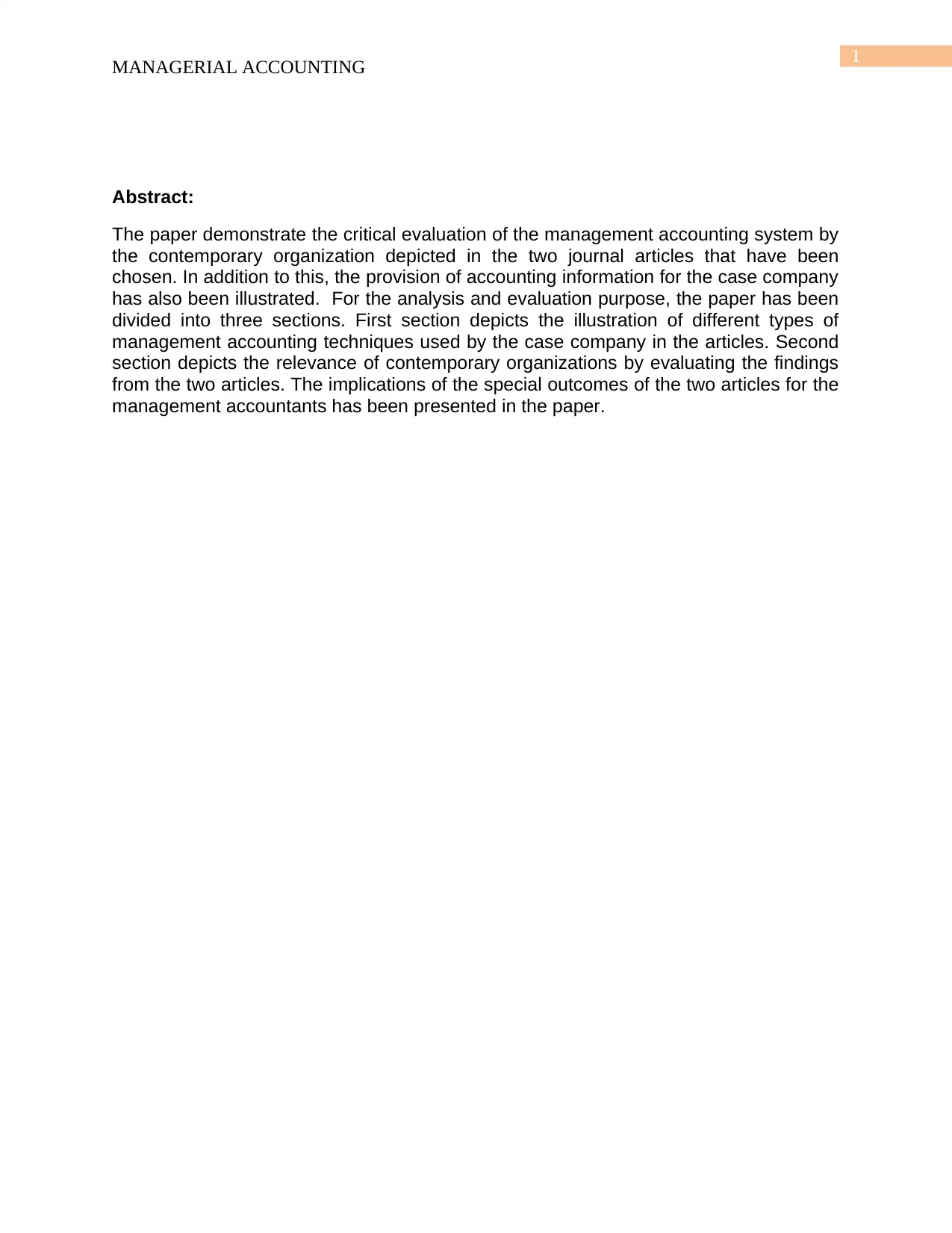
1
MANAGERIAL ACCOUNTING
Abstract:
The paper demonstrate the critical evaluation of the management accounting system by
the contemporary organization depicted in the two journal articles that have been
chosen. In addition to this, the provision of accounting information for the case company
has also been illustrated. For the analysis and evaluation purpose, the paper has been
divided into three sections. First section depicts the illustration of different types of
management accounting techniques used by the case company in the articles. Second
section depicts the relevance of contemporary organizations by evaluating the findings
from the two articles. The implications of the special outcomes of the two articles for the
management accountants has been presented in the paper.
MANAGERIAL ACCOUNTING
Abstract:
The paper demonstrate the critical evaluation of the management accounting system by
the contemporary organization depicted in the two journal articles that have been
chosen. In addition to this, the provision of accounting information for the case company
has also been illustrated. For the analysis and evaluation purpose, the paper has been
divided into three sections. First section depicts the illustration of different types of
management accounting techniques used by the case company in the articles. Second
section depicts the relevance of contemporary organizations by evaluating the findings
from the two articles. The implications of the special outcomes of the two articles for the
management accountants has been presented in the paper.
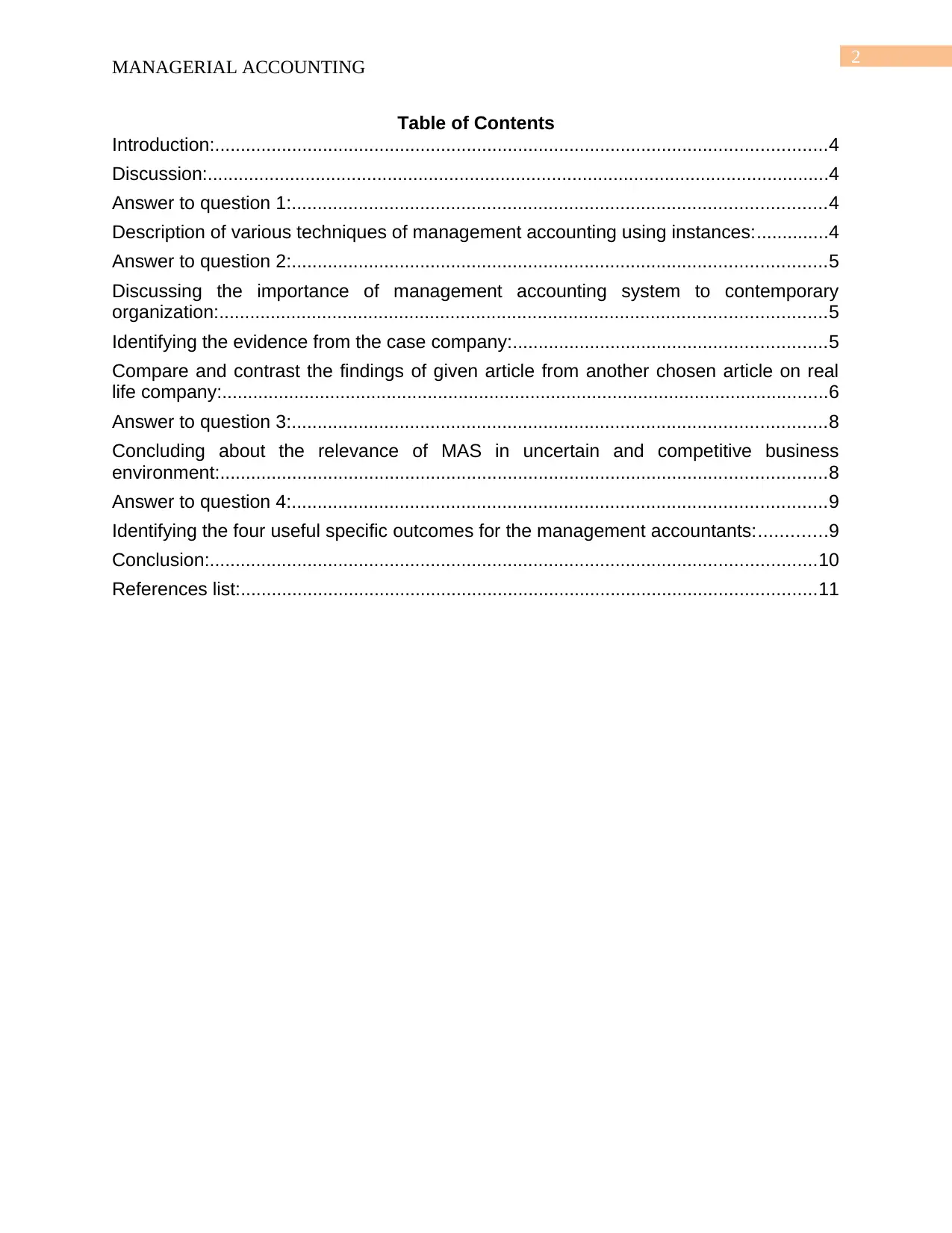
2
MANAGERIAL ACCOUNTING
Table of Contents
Introduction:.......................................................................................................................4
Discussion:.........................................................................................................................4
Answer to question 1:........................................................................................................4
Description of various techniques of management accounting using instances:..............4
Answer to question 2:........................................................................................................5
Discussing the importance of management accounting system to contemporary
organization:......................................................................................................................5
Identifying the evidence from the case company:.............................................................5
Compare and contrast the findings of given article from another chosen article on real
life company:......................................................................................................................6
Answer to question 3:........................................................................................................8
Concluding about the relevance of MAS in uncertain and competitive business
environment:......................................................................................................................8
Answer to question 4:........................................................................................................9
Identifying the four useful specific outcomes for the management accountants:.............9
Conclusion:......................................................................................................................10
References list:................................................................................................................11
MANAGERIAL ACCOUNTING
Table of Contents
Introduction:.......................................................................................................................4
Discussion:.........................................................................................................................4
Answer to question 1:........................................................................................................4
Description of various techniques of management accounting using instances:..............4
Answer to question 2:........................................................................................................5
Discussing the importance of management accounting system to contemporary
organization:......................................................................................................................5
Identifying the evidence from the case company:.............................................................5
Compare and contrast the findings of given article from another chosen article on real
life company:......................................................................................................................6
Answer to question 3:........................................................................................................8
Concluding about the relevance of MAS in uncertain and competitive business
environment:......................................................................................................................8
Answer to question 4:........................................................................................................9
Identifying the four useful specific outcomes for the management accountants:.............9
Conclusion:......................................................................................................................10
References list:................................................................................................................11
⊘ This is a preview!⊘
Do you want full access?
Subscribe today to unlock all pages.

Trusted by 1+ million students worldwide
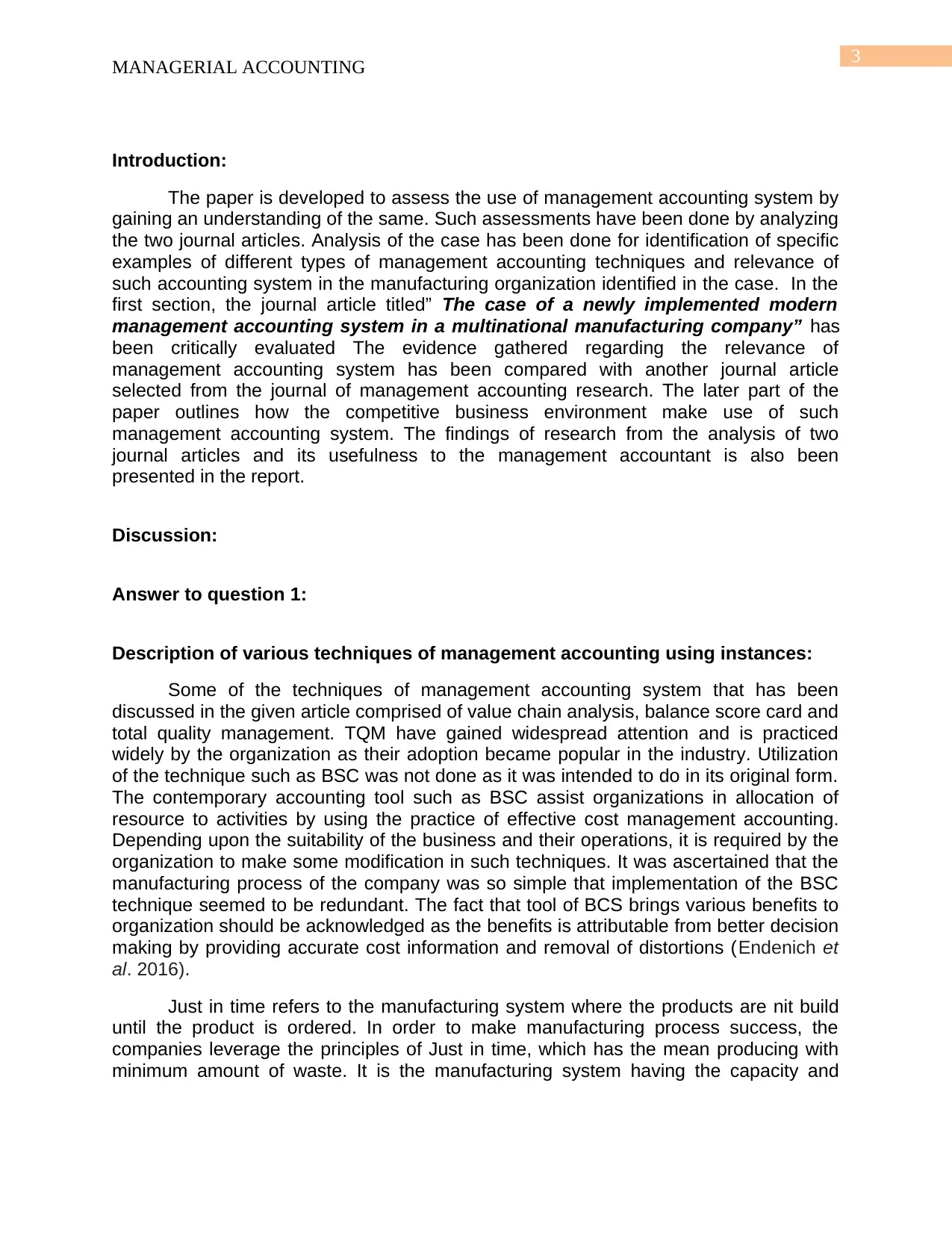
3
MANAGERIAL ACCOUNTING
Introduction:
The paper is developed to assess the use of management accounting system by
gaining an understanding of the same. Such assessments have been done by analyzing
the two journal articles. Analysis of the case has been done for identification of specific
examples of different types of management accounting techniques and relevance of
such accounting system in the manufacturing organization identified in the case. In the
first section, the journal article titled” The case of a newly implemented modern
management accounting system in a multinational manufacturing company” has
been critically evaluated The evidence gathered regarding the relevance of
management accounting system has been compared with another journal article
selected from the journal of management accounting research. The later part of the
paper outlines how the competitive business environment make use of such
management accounting system. The findings of research from the analysis of two
journal articles and its usefulness to the management accountant is also been
presented in the report.
Discussion:
Answer to question 1:
Description of various techniques of management accounting using instances:
Some of the techniques of management accounting system that has been
discussed in the given article comprised of value chain analysis, balance score card and
total quality management. TQM have gained widespread attention and is practiced
widely by the organization as their adoption became popular in the industry. Utilization
of the technique such as BSC was not done as it was intended to do in its original form.
The contemporary accounting tool such as BSC assist organizations in allocation of
resource to activities by using the practice of effective cost management accounting.
Depending upon the suitability of the business and their operations, it is required by the
organization to make some modification in such techniques. It was ascertained that the
manufacturing process of the company was so simple that implementation of the BSC
technique seemed to be redundant. The fact that tool of BCS brings various benefits to
organization should be acknowledged as the benefits is attributable from better decision
making by providing accurate cost information and removal of distortions (Endenich et
al. 2016).
Just in time refers to the manufacturing system where the products are nit build
until the product is ordered. In order to make manufacturing process success, the
companies leverage the principles of Just in time, which has the mean producing with
minimum amount of waste. It is the manufacturing system having the capacity and
MANAGERIAL ACCOUNTING
Introduction:
The paper is developed to assess the use of management accounting system by
gaining an understanding of the same. Such assessments have been done by analyzing
the two journal articles. Analysis of the case has been done for identification of specific
examples of different types of management accounting techniques and relevance of
such accounting system in the manufacturing organization identified in the case. In the
first section, the journal article titled” The case of a newly implemented modern
management accounting system in a multinational manufacturing company” has
been critically evaluated The evidence gathered regarding the relevance of
management accounting system has been compared with another journal article
selected from the journal of management accounting research. The later part of the
paper outlines how the competitive business environment make use of such
management accounting system. The findings of research from the analysis of two
journal articles and its usefulness to the management accountant is also been
presented in the report.
Discussion:
Answer to question 1:
Description of various techniques of management accounting using instances:
Some of the techniques of management accounting system that has been
discussed in the given article comprised of value chain analysis, balance score card and
total quality management. TQM have gained widespread attention and is practiced
widely by the organization as their adoption became popular in the industry. Utilization
of the technique such as BSC was not done as it was intended to do in its original form.
The contemporary accounting tool such as BSC assist organizations in allocation of
resource to activities by using the practice of effective cost management accounting.
Depending upon the suitability of the business and their operations, it is required by the
organization to make some modification in such techniques. It was ascertained that the
manufacturing process of the company was so simple that implementation of the BSC
technique seemed to be redundant. The fact that tool of BCS brings various benefits to
organization should be acknowledged as the benefits is attributable from better decision
making by providing accurate cost information and removal of distortions (Endenich et
al. 2016).
Just in time refers to the manufacturing system where the products are nit build
until the product is ordered. In order to make manufacturing process success, the
companies leverage the principles of Just in time, which has the mean producing with
minimum amount of waste. It is the manufacturing system having the capacity and
Paraphrase This Document
Need a fresh take? Get an instant paraphrase of this document with our AI Paraphraser
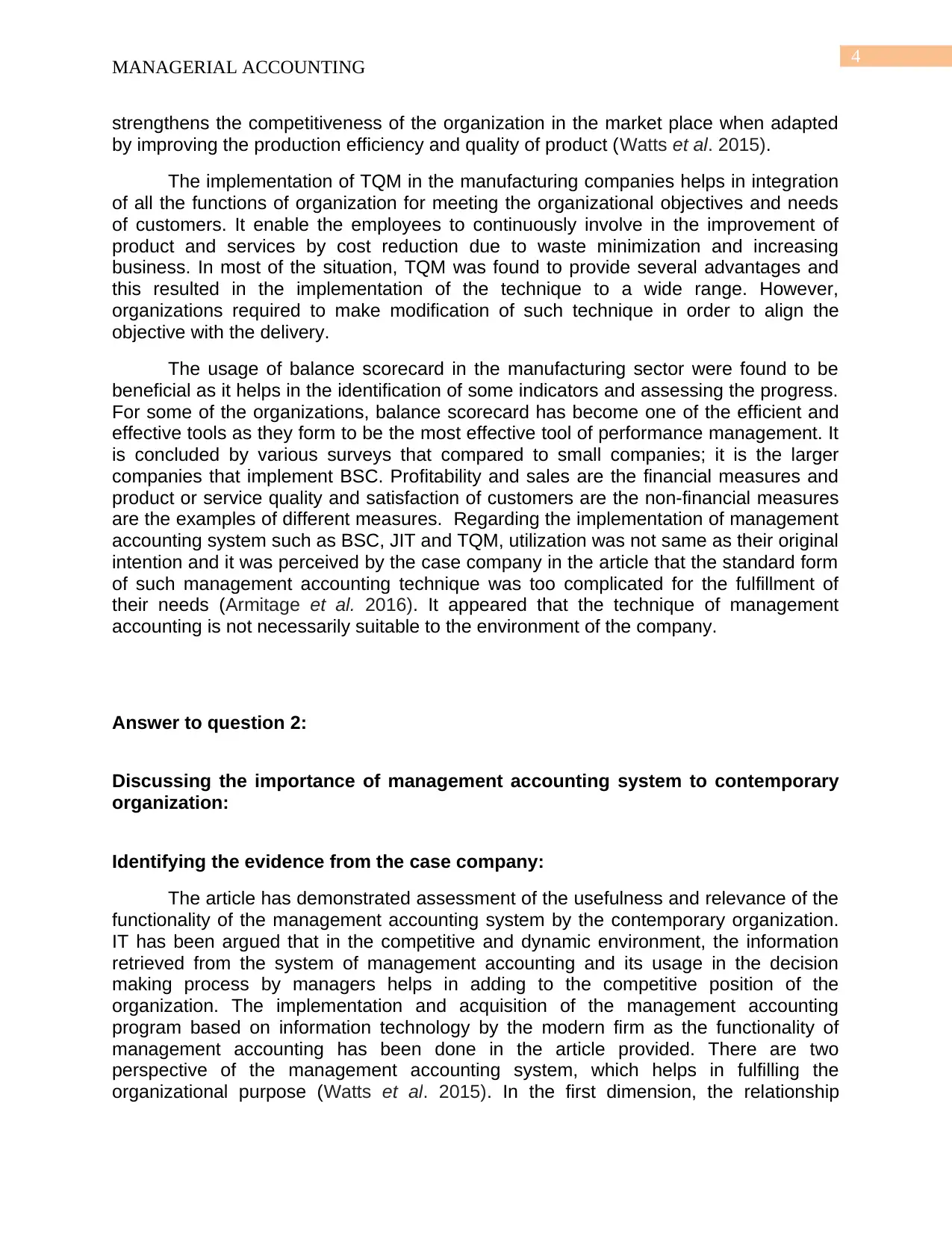
4
MANAGERIAL ACCOUNTING
strengthens the competitiveness of the organization in the market place when adapted
by improving the production efficiency and quality of product (Watts et al. 2015).
The implementation of TQM in the manufacturing companies helps in integration
of all the functions of organization for meeting the organizational objectives and needs
of customers. It enable the employees to continuously involve in the improvement of
product and services by cost reduction due to waste minimization and increasing
business. In most of the situation, TQM was found to provide several advantages and
this resulted in the implementation of the technique to a wide range. However,
organizations required to make modification of such technique in order to align the
objective with the delivery.
The usage of balance scorecard in the manufacturing sector were found to be
beneficial as it helps in the identification of some indicators and assessing the progress.
For some of the organizations, balance scorecard has become one of the efficient and
effective tools as they form to be the most effective tool of performance management. It
is concluded by various surveys that compared to small companies; it is the larger
companies that implement BSC. Profitability and sales are the financial measures and
product or service quality and satisfaction of customers are the non-financial measures
are the examples of different measures. Regarding the implementation of management
accounting system such as BSC, JIT and TQM, utilization was not same as their original
intention and it was perceived by the case company in the article that the standard form
of such management accounting technique was too complicated for the fulfillment of
their needs (Armitage et al. 2016). It appeared that the technique of management
accounting is not necessarily suitable to the environment of the company.
Answer to question 2:
Discussing the importance of management accounting system to contemporary
organization:
Identifying the evidence from the case company:
The article has demonstrated assessment of the usefulness and relevance of the
functionality of the management accounting system by the contemporary organization.
IT has been argued that in the competitive and dynamic environment, the information
retrieved from the system of management accounting and its usage in the decision
making process by managers helps in adding to the competitive position of the
organization. The implementation and acquisition of the management accounting
program based on information technology by the modern firm as the functionality of
management accounting has been done in the article provided. There are two
perspective of the management accounting system, which helps in fulfilling the
organizational purpose (Watts et al. 2015). In the first dimension, the relationship
MANAGERIAL ACCOUNTING
strengthens the competitiveness of the organization in the market place when adapted
by improving the production efficiency and quality of product (Watts et al. 2015).
The implementation of TQM in the manufacturing companies helps in integration
of all the functions of organization for meeting the organizational objectives and needs
of customers. It enable the employees to continuously involve in the improvement of
product and services by cost reduction due to waste minimization and increasing
business. In most of the situation, TQM was found to provide several advantages and
this resulted in the implementation of the technique to a wide range. However,
organizations required to make modification of such technique in order to align the
objective with the delivery.
The usage of balance scorecard in the manufacturing sector were found to be
beneficial as it helps in the identification of some indicators and assessing the progress.
For some of the organizations, balance scorecard has become one of the efficient and
effective tools as they form to be the most effective tool of performance management. It
is concluded by various surveys that compared to small companies; it is the larger
companies that implement BSC. Profitability and sales are the financial measures and
product or service quality and satisfaction of customers are the non-financial measures
are the examples of different measures. Regarding the implementation of management
accounting system such as BSC, JIT and TQM, utilization was not same as their original
intention and it was perceived by the case company in the article that the standard form
of such management accounting technique was too complicated for the fulfillment of
their needs (Armitage et al. 2016). It appeared that the technique of management
accounting is not necessarily suitable to the environment of the company.
Answer to question 2:
Discussing the importance of management accounting system to contemporary
organization:
Identifying the evidence from the case company:
The article has demonstrated assessment of the usefulness and relevance of the
functionality of the management accounting system by the contemporary organization.
IT has been argued that in the competitive and dynamic environment, the information
retrieved from the system of management accounting and its usage in the decision
making process by managers helps in adding to the competitive position of the
organization. The implementation and acquisition of the management accounting
program based on information technology by the modern firm as the functionality of
management accounting has been done in the article provided. There are two
perspective of the management accounting system, which helps in fulfilling the
organizational purpose (Watts et al. 2015). In the first dimension, the relationship
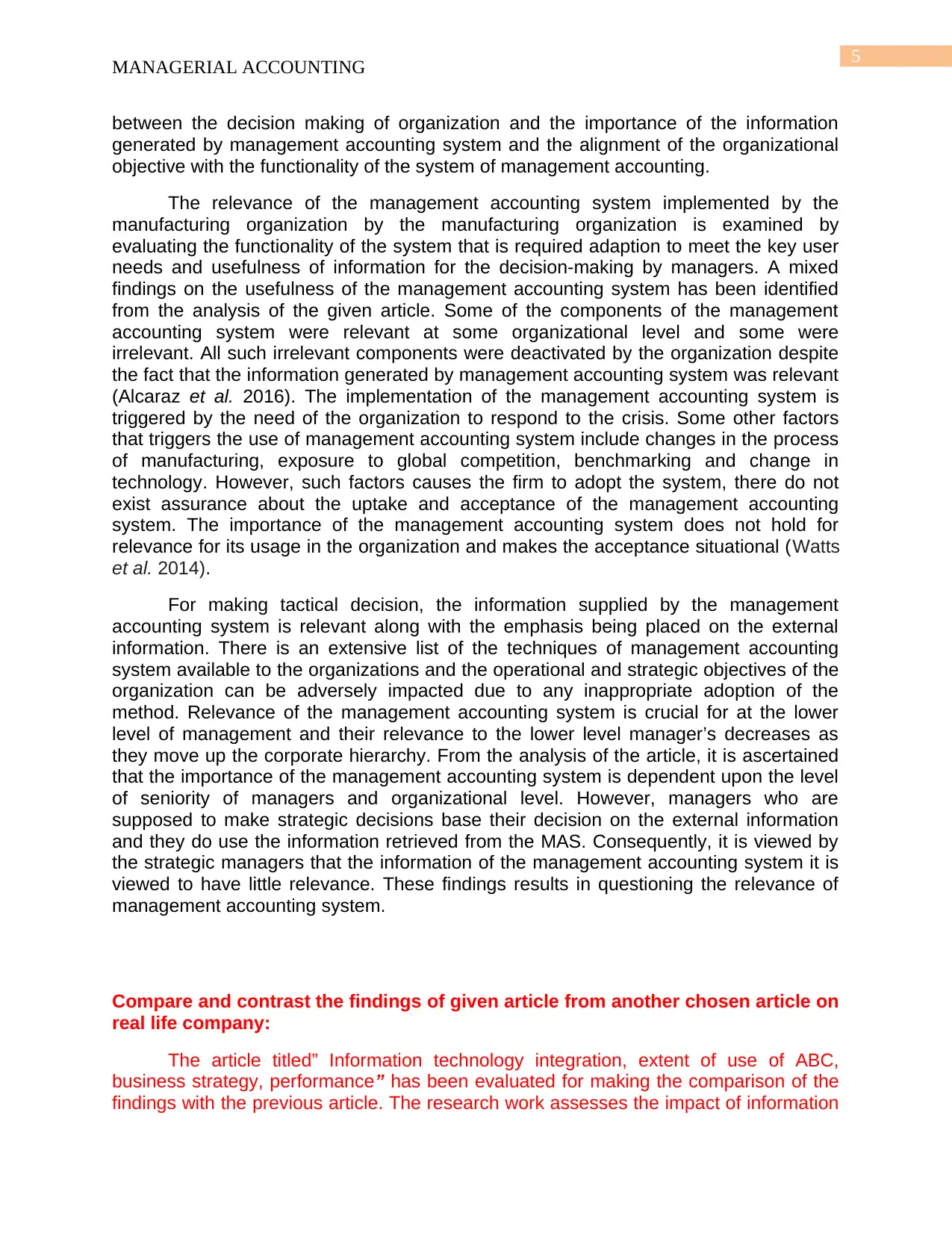
5
MANAGERIAL ACCOUNTING
between the decision making of organization and the importance of the information
generated by management accounting system and the alignment of the organizational
objective with the functionality of the system of management accounting.
The relevance of the management accounting system implemented by the
manufacturing organization by the manufacturing organization is examined by
evaluating the functionality of the system that is required adaption to meet the key user
needs and usefulness of information for the decision-making by managers. A mixed
findings on the usefulness of the management accounting system has been identified
from the analysis of the given article. Some of the components of the management
accounting system were relevant at some organizational level and some were
irrelevant. All such irrelevant components were deactivated by the organization despite
the fact that the information generated by management accounting system was relevant
(Alcaraz et al. 2016). The implementation of the management accounting system is
triggered by the need of the organization to respond to the crisis. Some other factors
that triggers the use of management accounting system include changes in the process
of manufacturing, exposure to global competition, benchmarking and change in
technology. However, such factors causes the firm to adopt the system, there do not
exist assurance about the uptake and acceptance of the management accounting
system. The importance of the management accounting system does not hold for
relevance for its usage in the organization and makes the acceptance situational (Watts
et al. 2014).
For making tactical decision, the information supplied by the management
accounting system is relevant along with the emphasis being placed on the external
information. There is an extensive list of the techniques of management accounting
system available to the organizations and the operational and strategic objectives of the
organization can be adversely impacted due to any inappropriate adoption of the
method. Relevance of the management accounting system is crucial for at the lower
level of management and their relevance to the lower level manager’s decreases as
they move up the corporate hierarchy. From the analysis of the article, it is ascertained
that the importance of the management accounting system is dependent upon the level
of seniority of managers and organizational level. However, managers who are
supposed to make strategic decisions base their decision on the external information
and they do use the information retrieved from the MAS. Consequently, it is viewed by
the strategic managers that the information of the management accounting system it is
viewed to have little relevance. These findings results in questioning the relevance of
management accounting system.
Compare and contrast the findings of given article from another chosen article on
real life company:
The article titled” Information technology integration, extent of use of ABC,
business strategy, performance” has been evaluated for making the comparison of the
findings with the previous article. The research work assesses the impact of information
MANAGERIAL ACCOUNTING
between the decision making of organization and the importance of the information
generated by management accounting system and the alignment of the organizational
objective with the functionality of the system of management accounting.
The relevance of the management accounting system implemented by the
manufacturing organization by the manufacturing organization is examined by
evaluating the functionality of the system that is required adaption to meet the key user
needs and usefulness of information for the decision-making by managers. A mixed
findings on the usefulness of the management accounting system has been identified
from the analysis of the given article. Some of the components of the management
accounting system were relevant at some organizational level and some were
irrelevant. All such irrelevant components were deactivated by the organization despite
the fact that the information generated by management accounting system was relevant
(Alcaraz et al. 2016). The implementation of the management accounting system is
triggered by the need of the organization to respond to the crisis. Some other factors
that triggers the use of management accounting system include changes in the process
of manufacturing, exposure to global competition, benchmarking and change in
technology. However, such factors causes the firm to adopt the system, there do not
exist assurance about the uptake and acceptance of the management accounting
system. The importance of the management accounting system does not hold for
relevance for its usage in the organization and makes the acceptance situational (Watts
et al. 2014).
For making tactical decision, the information supplied by the management
accounting system is relevant along with the emphasis being placed on the external
information. There is an extensive list of the techniques of management accounting
system available to the organizations and the operational and strategic objectives of the
organization can be adversely impacted due to any inappropriate adoption of the
method. Relevance of the management accounting system is crucial for at the lower
level of management and their relevance to the lower level manager’s decreases as
they move up the corporate hierarchy. From the analysis of the article, it is ascertained
that the importance of the management accounting system is dependent upon the level
of seniority of managers and organizational level. However, managers who are
supposed to make strategic decisions base their decision on the external information
and they do use the information retrieved from the MAS. Consequently, it is viewed by
the strategic managers that the information of the management accounting system it is
viewed to have little relevance. These findings results in questioning the relevance of
management accounting system.
Compare and contrast the findings of given article from another chosen article on
real life company:
The article titled” Information technology integration, extent of use of ABC,
business strategy, performance” has been evaluated for making the comparison of the
findings with the previous article. The research work assesses the impact of information
⊘ This is a preview!⊘
Do you want full access?
Subscribe today to unlock all pages.

Trusted by 1+ million students worldwide
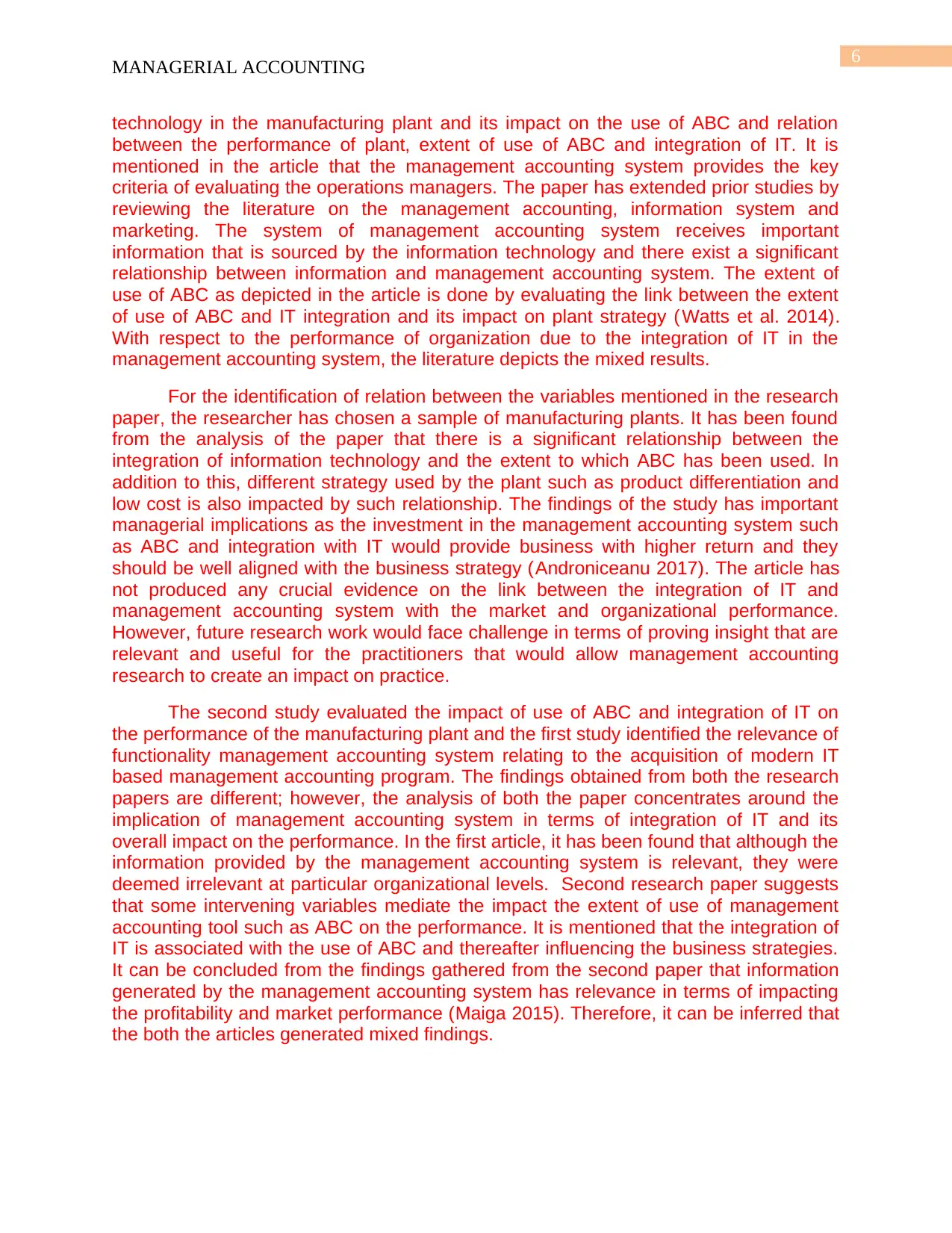
6
MANAGERIAL ACCOUNTING
technology in the manufacturing plant and its impact on the use of ABC and relation
between the performance of plant, extent of use of ABC and integration of IT. It is
mentioned in the article that the management accounting system provides the key
criteria of evaluating the operations managers. The paper has extended prior studies by
reviewing the literature on the management accounting, information system and
marketing. The system of management accounting system receives important
information that is sourced by the information technology and there exist a significant
relationship between information and management accounting system. The extent of
use of ABC as depicted in the article is done by evaluating the link between the extent
of use of ABC and IT integration and its impact on plant strategy ( Watts et al. 2014).
With respect to the performance of organization due to the integration of IT in the
management accounting system, the literature depicts the mixed results.
For the identification of relation between the variables mentioned in the research
paper, the researcher has chosen a sample of manufacturing plants. It has been found
from the analysis of the paper that there is a significant relationship between the
integration of information technology and the extent to which ABC has been used. In
addition to this, different strategy used by the plant such as product differentiation and
low cost is also impacted by such relationship. The findings of the study has important
managerial implications as the investment in the management accounting system such
as ABC and integration with IT would provide business with higher return and they
should be well aligned with the business strategy (Androniceanu 2017). The article has
not produced any crucial evidence on the link between the integration of IT and
management accounting system with the market and organizational performance.
However, future research work would face challenge in terms of proving insight that are
relevant and useful for the practitioners that would allow management accounting
research to create an impact on practice.
The second study evaluated the impact of use of ABC and integration of IT on
the performance of the manufacturing plant and the first study identified the relevance of
functionality management accounting system relating to the acquisition of modern IT
based management accounting program. The findings obtained from both the research
papers are different; however, the analysis of both the paper concentrates around the
implication of management accounting system in terms of integration of IT and its
overall impact on the performance. In the first article, it has been found that although the
information provided by the management accounting system is relevant, they were
deemed irrelevant at particular organizational levels. Second research paper suggests
that some intervening variables mediate the impact the extent of use of management
accounting tool such as ABC on the performance. It is mentioned that the integration of
IT is associated with the use of ABC and thereafter influencing the business strategies.
It can be concluded from the findings gathered from the second paper that information
generated by the management accounting system has relevance in terms of impacting
the profitability and market performance (Maiga 2015). Therefore, it can be inferred that
the both the articles generated mixed findings.
MANAGERIAL ACCOUNTING
technology in the manufacturing plant and its impact on the use of ABC and relation
between the performance of plant, extent of use of ABC and integration of IT. It is
mentioned in the article that the management accounting system provides the key
criteria of evaluating the operations managers. The paper has extended prior studies by
reviewing the literature on the management accounting, information system and
marketing. The system of management accounting system receives important
information that is sourced by the information technology and there exist a significant
relationship between information and management accounting system. The extent of
use of ABC as depicted in the article is done by evaluating the link between the extent
of use of ABC and IT integration and its impact on plant strategy ( Watts et al. 2014).
With respect to the performance of organization due to the integration of IT in the
management accounting system, the literature depicts the mixed results.
For the identification of relation between the variables mentioned in the research
paper, the researcher has chosen a sample of manufacturing plants. It has been found
from the analysis of the paper that there is a significant relationship between the
integration of information technology and the extent to which ABC has been used. In
addition to this, different strategy used by the plant such as product differentiation and
low cost is also impacted by such relationship. The findings of the study has important
managerial implications as the investment in the management accounting system such
as ABC and integration with IT would provide business with higher return and they
should be well aligned with the business strategy (Androniceanu 2017). The article has
not produced any crucial evidence on the link between the integration of IT and
management accounting system with the market and organizational performance.
However, future research work would face challenge in terms of proving insight that are
relevant and useful for the practitioners that would allow management accounting
research to create an impact on practice.
The second study evaluated the impact of use of ABC and integration of IT on
the performance of the manufacturing plant and the first study identified the relevance of
functionality management accounting system relating to the acquisition of modern IT
based management accounting program. The findings obtained from both the research
papers are different; however, the analysis of both the paper concentrates around the
implication of management accounting system in terms of integration of IT and its
overall impact on the performance. In the first article, it has been found that although the
information provided by the management accounting system is relevant, they were
deemed irrelevant at particular organizational levels. Second research paper suggests
that some intervening variables mediate the impact the extent of use of management
accounting tool such as ABC on the performance. It is mentioned that the integration of
IT is associated with the use of ABC and thereafter influencing the business strategies.
It can be concluded from the findings gathered from the second paper that information
generated by the management accounting system has relevance in terms of impacting
the profitability and market performance (Maiga 2015). Therefore, it can be inferred that
the both the articles generated mixed findings.
Paraphrase This Document
Need a fresh take? Get an instant paraphrase of this document with our AI Paraphraser
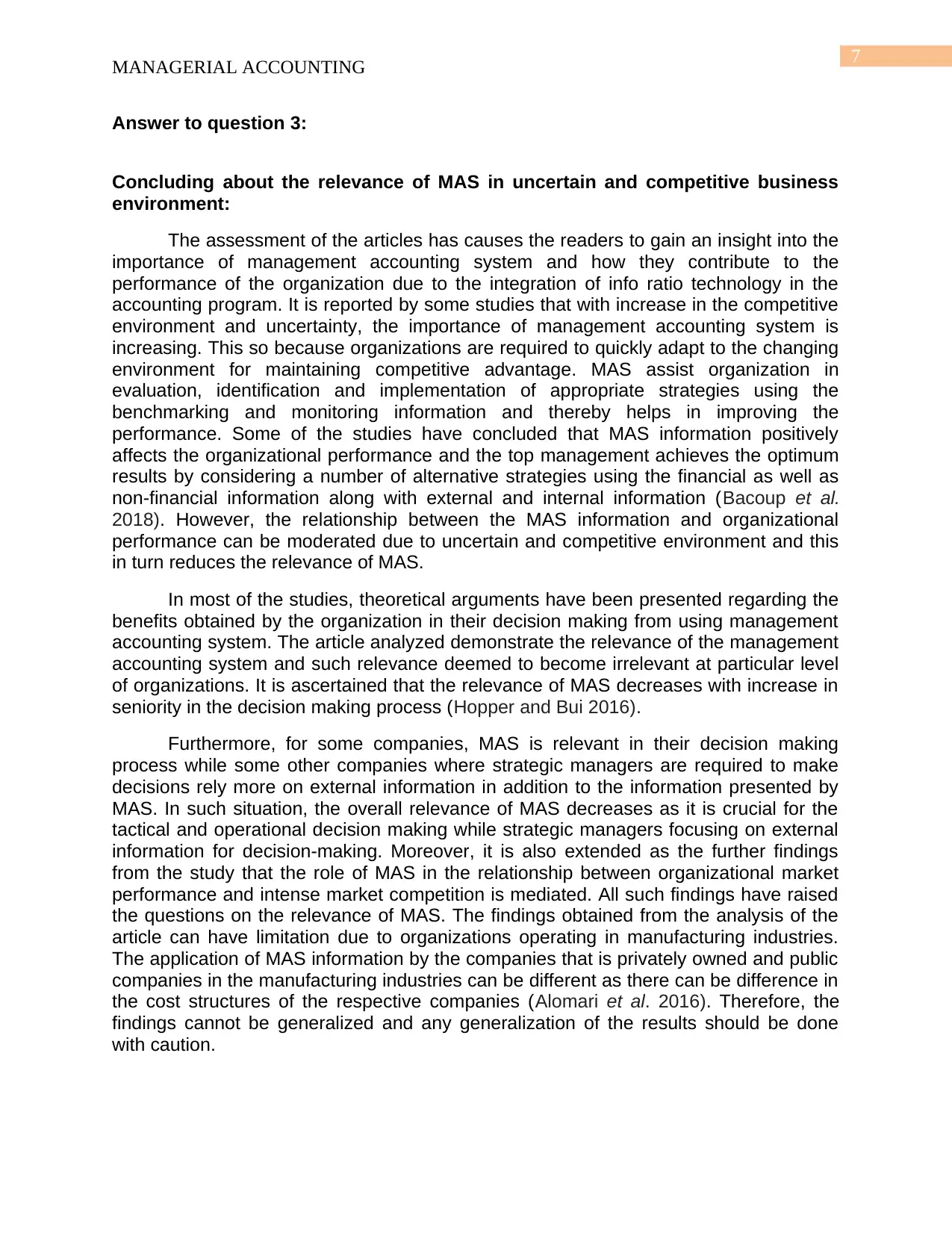
7
MANAGERIAL ACCOUNTING
Answer to question 3:
Concluding about the relevance of MAS in uncertain and competitive business
environment:
The assessment of the articles has causes the readers to gain an insight into the
importance of management accounting system and how they contribute to the
performance of the organization due to the integration of info ratio technology in the
accounting program. It is reported by some studies that with increase in the competitive
environment and uncertainty, the importance of management accounting system is
increasing. This so because organizations are required to quickly adapt to the changing
environment for maintaining competitive advantage. MAS assist organization in
evaluation, identification and implementation of appropriate strategies using the
benchmarking and monitoring information and thereby helps in improving the
performance. Some of the studies have concluded that MAS information positively
affects the organizational performance and the top management achieves the optimum
results by considering a number of alternative strategies using the financial as well as
non-financial information along with external and internal information (Bacoup et al.
2018). However, the relationship between the MAS information and organizational
performance can be moderated due to uncertain and competitive environment and this
in turn reduces the relevance of MAS.
In most of the studies, theoretical arguments have been presented regarding the
benefits obtained by the organization in their decision making from using management
accounting system. The article analyzed demonstrate the relevance of the management
accounting system and such relevance deemed to become irrelevant at particular level
of organizations. It is ascertained that the relevance of MAS decreases with increase in
seniority in the decision making process (Hopper and Bui 2016).
Furthermore, for some companies, MAS is relevant in their decision making
process while some other companies where strategic managers are required to make
decisions rely more on external information in addition to the information presented by
MAS. In such situation, the overall relevance of MAS decreases as it is crucial for the
tactical and operational decision making while strategic managers focusing on external
information for decision-making. Moreover, it is also extended as the further findings
from the study that the role of MAS in the relationship between organizational market
performance and intense market competition is mediated. All such findings have raised
the questions on the relevance of MAS. The findings obtained from the analysis of the
article can have limitation due to organizations operating in manufacturing industries.
The application of MAS information by the companies that is privately owned and public
companies in the manufacturing industries can be different as there can be difference in
the cost structures of the respective companies (Alomari et al. 2016). Therefore, the
findings cannot be generalized and any generalization of the results should be done
with caution.
MANAGERIAL ACCOUNTING
Answer to question 3:
Concluding about the relevance of MAS in uncertain and competitive business
environment:
The assessment of the articles has causes the readers to gain an insight into the
importance of management accounting system and how they contribute to the
performance of the organization due to the integration of info ratio technology in the
accounting program. It is reported by some studies that with increase in the competitive
environment and uncertainty, the importance of management accounting system is
increasing. This so because organizations are required to quickly adapt to the changing
environment for maintaining competitive advantage. MAS assist organization in
evaluation, identification and implementation of appropriate strategies using the
benchmarking and monitoring information and thereby helps in improving the
performance. Some of the studies have concluded that MAS information positively
affects the organizational performance and the top management achieves the optimum
results by considering a number of alternative strategies using the financial as well as
non-financial information along with external and internal information (Bacoup et al.
2018). However, the relationship between the MAS information and organizational
performance can be moderated due to uncertain and competitive environment and this
in turn reduces the relevance of MAS.
In most of the studies, theoretical arguments have been presented regarding the
benefits obtained by the organization in their decision making from using management
accounting system. The article analyzed demonstrate the relevance of the management
accounting system and such relevance deemed to become irrelevant at particular level
of organizations. It is ascertained that the relevance of MAS decreases with increase in
seniority in the decision making process (Hopper and Bui 2016).
Furthermore, for some companies, MAS is relevant in their decision making
process while some other companies where strategic managers are required to make
decisions rely more on external information in addition to the information presented by
MAS. In such situation, the overall relevance of MAS decreases as it is crucial for the
tactical and operational decision making while strategic managers focusing on external
information for decision-making. Moreover, it is also extended as the further findings
from the study that the role of MAS in the relationship between organizational market
performance and intense market competition is mediated. All such findings have raised
the questions on the relevance of MAS. The findings obtained from the analysis of the
article can have limitation due to organizations operating in manufacturing industries.
The application of MAS information by the companies that is privately owned and public
companies in the manufacturing industries can be different as there can be difference in
the cost structures of the respective companies (Alomari et al. 2016). Therefore, the
findings cannot be generalized and any generalization of the results should be done
with caution.
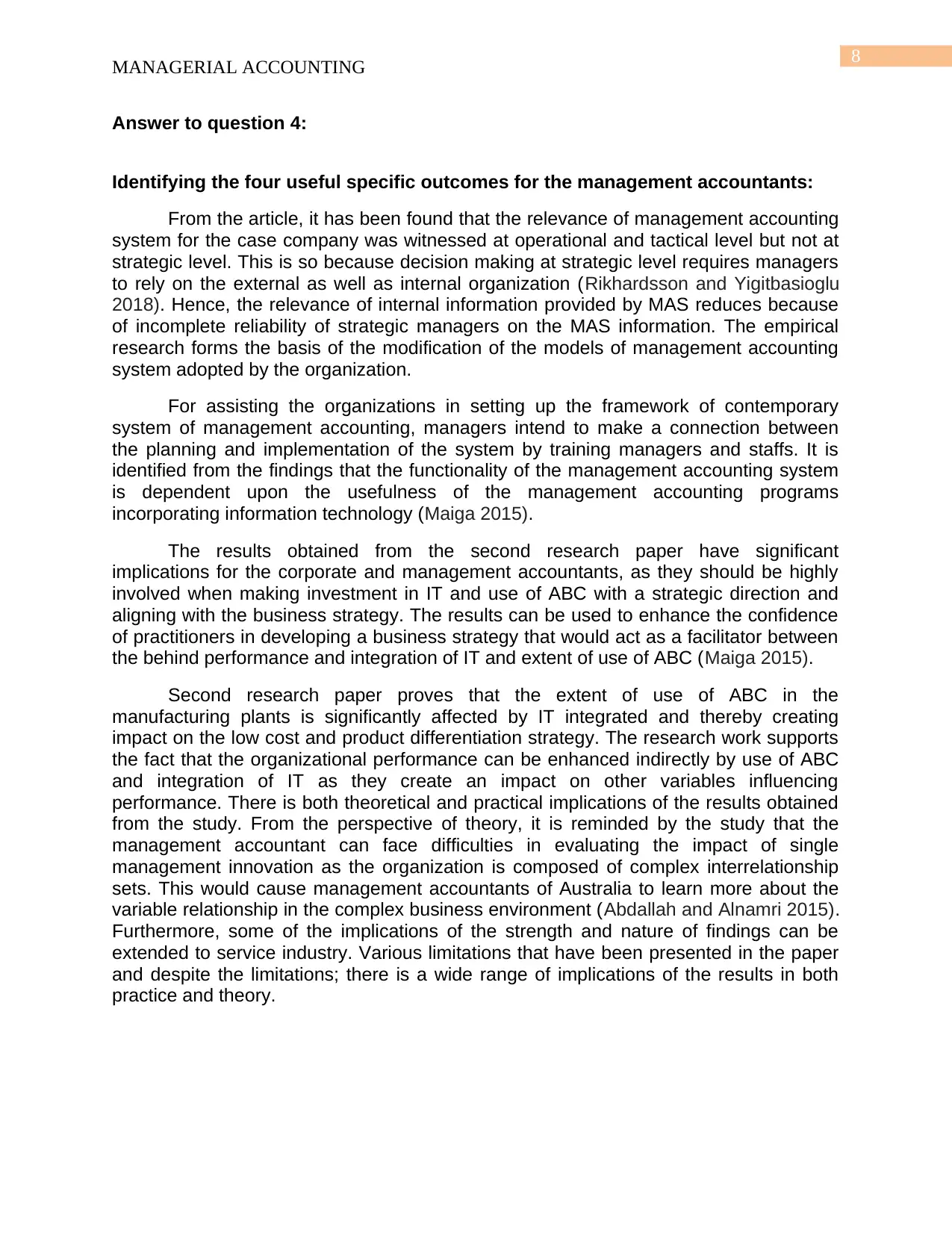
8
MANAGERIAL ACCOUNTING
Answer to question 4:
Identifying the four useful specific outcomes for the management accountants:
From the article, it has been found that the relevance of management accounting
system for the case company was witnessed at operational and tactical level but not at
strategic level. This is so because decision making at strategic level requires managers
to rely on the external as well as internal organization (Rikhardsson and Yigitbasioglu
2018). Hence, the relevance of internal information provided by MAS reduces because
of incomplete reliability of strategic managers on the MAS information. The empirical
research forms the basis of the modification of the models of management accounting
system adopted by the organization.
For assisting the organizations in setting up the framework of contemporary
system of management accounting, managers intend to make a connection between
the planning and implementation of the system by training managers and staffs. It is
identified from the findings that the functionality of the management accounting system
is dependent upon the usefulness of the management accounting programs
incorporating information technology (Maiga 2015).
The results obtained from the second research paper have significant
implications for the corporate and management accountants, as they should be highly
involved when making investment in IT and use of ABC with a strategic direction and
aligning with the business strategy. The results can be used to enhance the confidence
of practitioners in developing a business strategy that would act as a facilitator between
the behind performance and integration of IT and extent of use of ABC (Maiga 2015).
Second research paper proves that the extent of use of ABC in the
manufacturing plants is significantly affected by IT integrated and thereby creating
impact on the low cost and product differentiation strategy. The research work supports
the fact that the organizational performance can be enhanced indirectly by use of ABC
and integration of IT as they create an impact on other variables influencing
performance. There is both theoretical and practical implications of the results obtained
from the study. From the perspective of theory, it is reminded by the study that the
management accountant can face difficulties in evaluating the impact of single
management innovation as the organization is composed of complex interrelationship
sets. This would cause management accountants of Australia to learn more about the
variable relationship in the complex business environment (Abdallah and Alnamri 2015).
Furthermore, some of the implications of the strength and nature of findings can be
extended to service industry. Various limitations that have been presented in the paper
and despite the limitations; there is a wide range of implications of the results in both
practice and theory.
MANAGERIAL ACCOUNTING
Answer to question 4:
Identifying the four useful specific outcomes for the management accountants:
From the article, it has been found that the relevance of management accounting
system for the case company was witnessed at operational and tactical level but not at
strategic level. This is so because decision making at strategic level requires managers
to rely on the external as well as internal organization (Rikhardsson and Yigitbasioglu
2018). Hence, the relevance of internal information provided by MAS reduces because
of incomplete reliability of strategic managers on the MAS information. The empirical
research forms the basis of the modification of the models of management accounting
system adopted by the organization.
For assisting the organizations in setting up the framework of contemporary
system of management accounting, managers intend to make a connection between
the planning and implementation of the system by training managers and staffs. It is
identified from the findings that the functionality of the management accounting system
is dependent upon the usefulness of the management accounting programs
incorporating information technology (Maiga 2015).
The results obtained from the second research paper have significant
implications for the corporate and management accountants, as they should be highly
involved when making investment in IT and use of ABC with a strategic direction and
aligning with the business strategy. The results can be used to enhance the confidence
of practitioners in developing a business strategy that would act as a facilitator between
the behind performance and integration of IT and extent of use of ABC (Maiga 2015).
Second research paper proves that the extent of use of ABC in the
manufacturing plants is significantly affected by IT integrated and thereby creating
impact on the low cost and product differentiation strategy. The research work supports
the fact that the organizational performance can be enhanced indirectly by use of ABC
and integration of IT as they create an impact on other variables influencing
performance. There is both theoretical and practical implications of the results obtained
from the study. From the perspective of theory, it is reminded by the study that the
management accountant can face difficulties in evaluating the impact of single
management innovation as the organization is composed of complex interrelationship
sets. This would cause management accountants of Australia to learn more about the
variable relationship in the complex business environment (Abdallah and Alnamri 2015).
Furthermore, some of the implications of the strength and nature of findings can be
extended to service industry. Various limitations that have been presented in the paper
and despite the limitations; there is a wide range of implications of the results in both
practice and theory.
⊘ This is a preview!⊘
Do you want full access?
Subscribe today to unlock all pages.

Trusted by 1+ million students worldwide
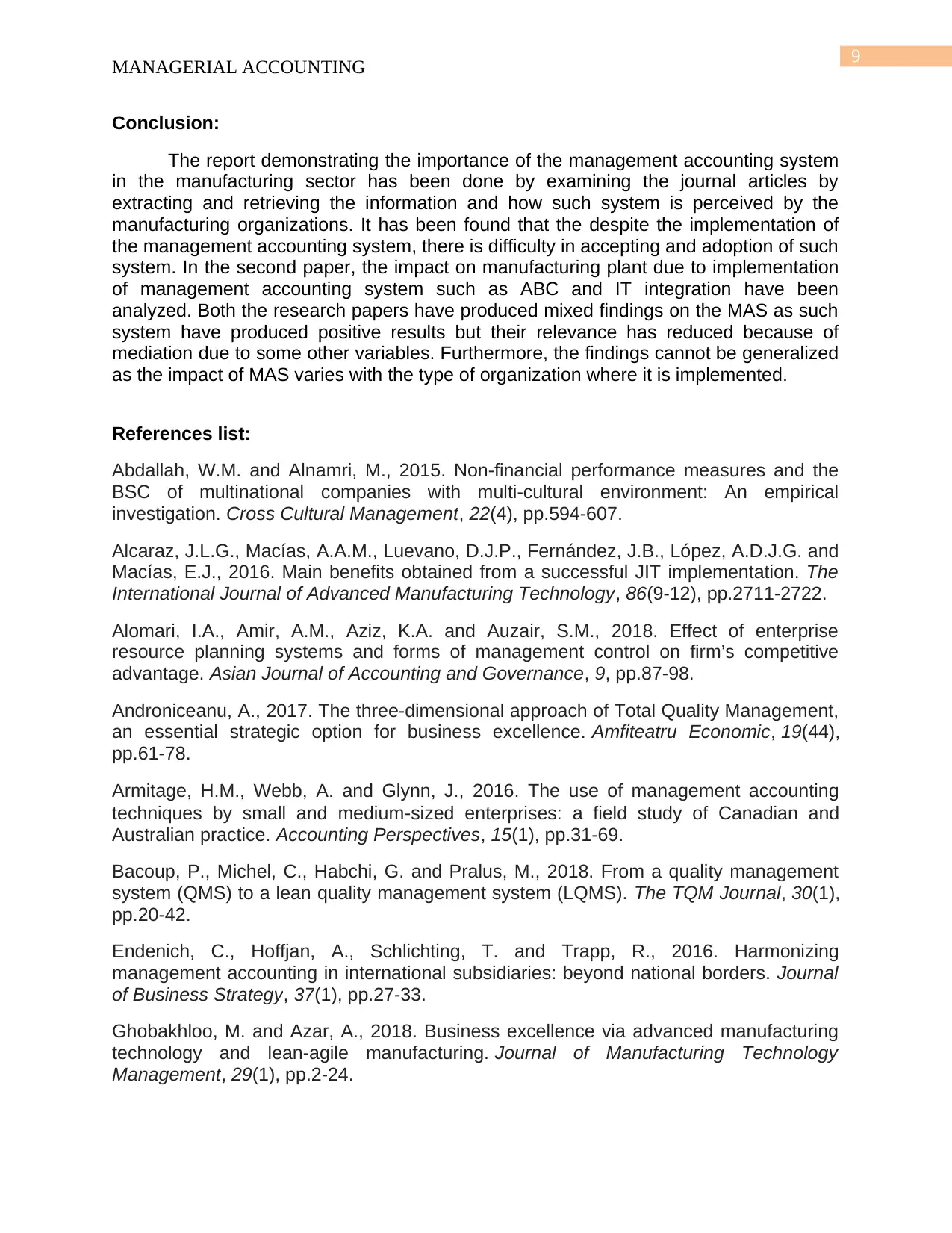
9
MANAGERIAL ACCOUNTING
Conclusion:
The report demonstrating the importance of the management accounting system
in the manufacturing sector has been done by examining the journal articles by
extracting and retrieving the information and how such system is perceived by the
manufacturing organizations. It has been found that the despite the implementation of
the management accounting system, there is difficulty in accepting and adoption of such
system. In the second paper, the impact on manufacturing plant due to implementation
of management accounting system such as ABC and IT integration have been
analyzed. Both the research papers have produced mixed findings on the MAS as such
system have produced positive results but their relevance has reduced because of
mediation due to some other variables. Furthermore, the findings cannot be generalized
as the impact of MAS varies with the type of organization where it is implemented.
References list:
Abdallah, W.M. and Alnamri, M., 2015. Non-financial performance measures and the
BSC of multinational companies with multi-cultural environment: An empirical
investigation. Cross Cultural Management, 22(4), pp.594-607.
Alcaraz, J.L.G., Macías, A.A.M., Luevano, D.J.P., Fernández, J.B., López, A.D.J.G. and
Macías, E.J., 2016. Main benefits obtained from a successful JIT implementation. The
International Journal of Advanced Manufacturing Technology, 86(9-12), pp.2711-2722.
Alomari, I.A., Amir, A.M., Aziz, K.A. and Auzair, S.M., 2018. Effect of enterprise
resource planning systems and forms of management control on firm’s competitive
advantage. Asian Journal of Accounting and Governance, 9, pp.87-98.
Androniceanu, A., 2017. The three-dimensional approach of Total Quality Management,
an essential strategic option for business excellence. Amfiteatru Economic, 19(44),
pp.61-78.
Armitage, H.M., Webb, A. and Glynn, J., 2016. The use of management accounting
techniques by small and medium‐sized enterprises: a field study of Canadian and
Australian practice. Accounting Perspectives, 15(1), pp.31-69.
Bacoup, P., Michel, C., Habchi, G. and Pralus, M., 2018. From a quality management
system (QMS) to a lean quality management system (LQMS). The TQM Journal, 30(1),
pp.20-42.
Endenich, C., Hoffjan, A., Schlichting, T. and Trapp, R., 2016. Harmonizing
management accounting in international subsidiaries: beyond national borders. Journal
of Business Strategy, 37(1), pp.27-33.
Ghobakhloo, M. and Azar, A., 2018. Business excellence via advanced manufacturing
technology and lean-agile manufacturing. Journal of Manufacturing Technology
Management, 29(1), pp.2-24.
MANAGERIAL ACCOUNTING
Conclusion:
The report demonstrating the importance of the management accounting system
in the manufacturing sector has been done by examining the journal articles by
extracting and retrieving the information and how such system is perceived by the
manufacturing organizations. It has been found that the despite the implementation of
the management accounting system, there is difficulty in accepting and adoption of such
system. In the second paper, the impact on manufacturing plant due to implementation
of management accounting system such as ABC and IT integration have been
analyzed. Both the research papers have produced mixed findings on the MAS as such
system have produced positive results but their relevance has reduced because of
mediation due to some other variables. Furthermore, the findings cannot be generalized
as the impact of MAS varies with the type of organization where it is implemented.
References list:
Abdallah, W.M. and Alnamri, M., 2015. Non-financial performance measures and the
BSC of multinational companies with multi-cultural environment: An empirical
investigation. Cross Cultural Management, 22(4), pp.594-607.
Alcaraz, J.L.G., Macías, A.A.M., Luevano, D.J.P., Fernández, J.B., López, A.D.J.G. and
Macías, E.J., 2016. Main benefits obtained from a successful JIT implementation. The
International Journal of Advanced Manufacturing Technology, 86(9-12), pp.2711-2722.
Alomari, I.A., Amir, A.M., Aziz, K.A. and Auzair, S.M., 2018. Effect of enterprise
resource planning systems and forms of management control on firm’s competitive
advantage. Asian Journal of Accounting and Governance, 9, pp.87-98.
Androniceanu, A., 2017. The three-dimensional approach of Total Quality Management,
an essential strategic option for business excellence. Amfiteatru Economic, 19(44),
pp.61-78.
Armitage, H.M., Webb, A. and Glynn, J., 2016. The use of management accounting
techniques by small and medium‐sized enterprises: a field study of Canadian and
Australian practice. Accounting Perspectives, 15(1), pp.31-69.
Bacoup, P., Michel, C., Habchi, G. and Pralus, M., 2018. From a quality management
system (QMS) to a lean quality management system (LQMS). The TQM Journal, 30(1),
pp.20-42.
Endenich, C., Hoffjan, A., Schlichting, T. and Trapp, R., 2016. Harmonizing
management accounting in international subsidiaries: beyond national borders. Journal
of Business Strategy, 37(1), pp.27-33.
Ghobakhloo, M. and Azar, A., 2018. Business excellence via advanced manufacturing
technology and lean-agile manufacturing. Journal of Manufacturing Technology
Management, 29(1), pp.2-24.
Paraphrase This Document
Need a fresh take? Get an instant paraphrase of this document with our AI Paraphraser
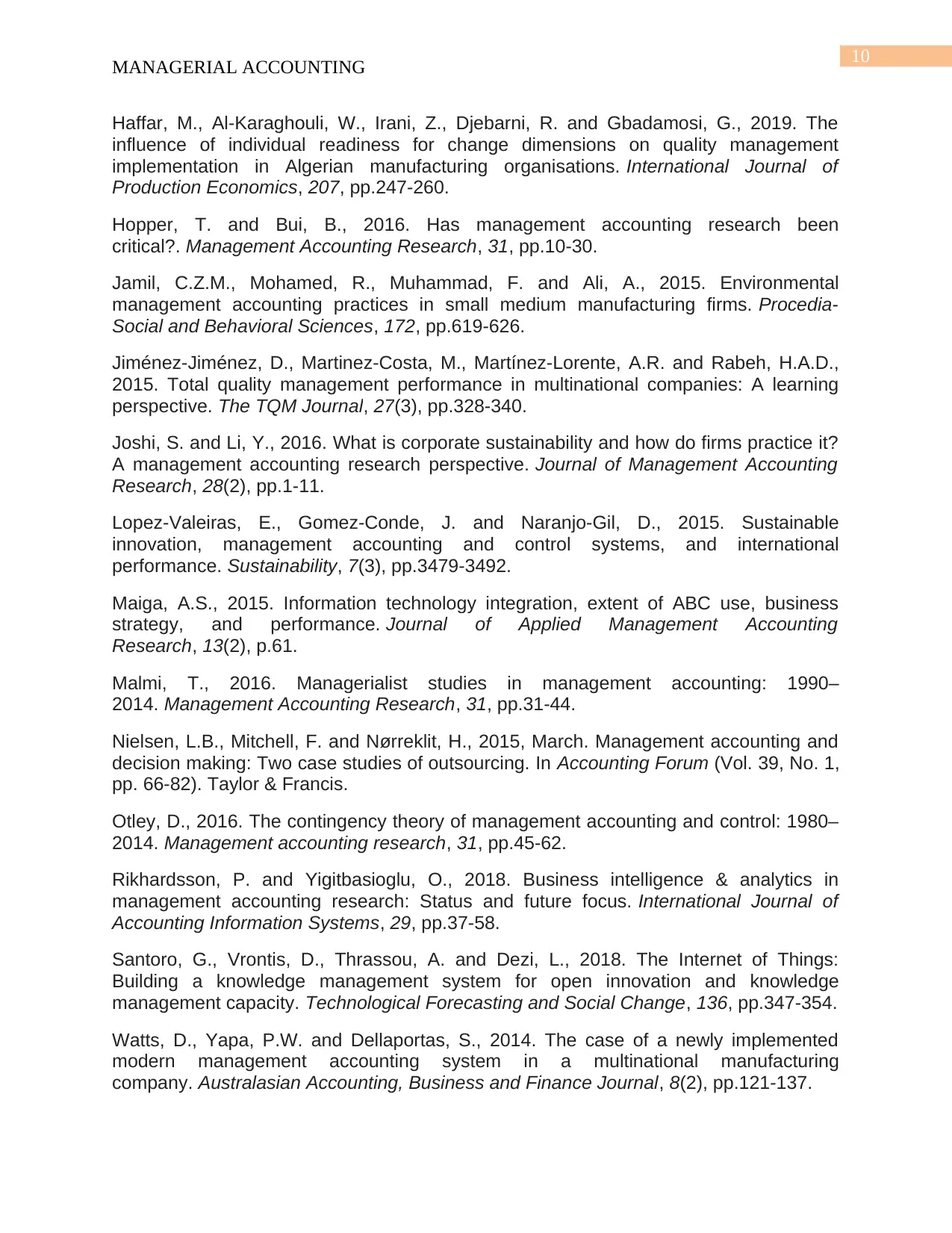
10
MANAGERIAL ACCOUNTING
Haffar, M., Al-Karaghouli, W., Irani, Z., Djebarni, R. and Gbadamosi, G., 2019. The
influence of individual readiness for change dimensions on quality management
implementation in Algerian manufacturing organisations. International Journal of
Production Economics, 207, pp.247-260.
Hopper, T. and Bui, B., 2016. Has management accounting research been
critical?. Management Accounting Research, 31, pp.10-30.
Jamil, C.Z.M., Mohamed, R., Muhammad, F. and Ali, A., 2015. Environmental
management accounting practices in small medium manufacturing firms. Procedia-
Social and Behavioral Sciences, 172, pp.619-626.
Jiménez-Jiménez, D., Martinez-Costa, M., Martínez-Lorente, A.R. and Rabeh, H.A.D.,
2015. Total quality management performance in multinational companies: A learning
perspective. The TQM Journal, 27(3), pp.328-340.
Joshi, S. and Li, Y., 2016. What is corporate sustainability and how do firms practice it?
A management accounting research perspective. Journal of Management Accounting
Research, 28(2), pp.1-11.
Lopez-Valeiras, E., Gomez-Conde, J. and Naranjo-Gil, D., 2015. Sustainable
innovation, management accounting and control systems, and international
performance. Sustainability, 7(3), pp.3479-3492.
Maiga, A.S., 2015. Information technology integration, extent of ABC use, business
strategy, and performance. Journal of Applied Management Accounting
Research, 13(2), p.61.
Malmi, T., 2016. Managerialist studies in management accounting: 1990–
2014. Management Accounting Research, 31, pp.31-44.
Nielsen, L.B., Mitchell, F. and Nørreklit, H., 2015, March. Management accounting and
decision making: Two case studies of outsourcing. In Accounting Forum (Vol. 39, No. 1,
pp. 66-82). Taylor & Francis.
Otley, D., 2016. The contingency theory of management accounting and control: 1980–
2014. Management accounting research, 31, pp.45-62.
Rikhardsson, P. and Yigitbasioglu, O., 2018. Business intelligence & analytics in
management accounting research: Status and future focus. International Journal of
Accounting Information Systems, 29, pp.37-58.
Santoro, G., Vrontis, D., Thrassou, A. and Dezi, L., 2018. The Internet of Things:
Building a knowledge management system for open innovation and knowledge
management capacity. Technological Forecasting and Social Change, 136, pp.347-354.
Watts, D., Yapa, P.W. and Dellaportas, S., 2014. The case of a newly implemented
modern management accounting system in a multinational manufacturing
company. Australasian Accounting, Business and Finance Journal, 8(2), pp.121-137.
MANAGERIAL ACCOUNTING
Haffar, M., Al-Karaghouli, W., Irani, Z., Djebarni, R. and Gbadamosi, G., 2019. The
influence of individual readiness for change dimensions on quality management
implementation in Algerian manufacturing organisations. International Journal of
Production Economics, 207, pp.247-260.
Hopper, T. and Bui, B., 2016. Has management accounting research been
critical?. Management Accounting Research, 31, pp.10-30.
Jamil, C.Z.M., Mohamed, R., Muhammad, F. and Ali, A., 2015. Environmental
management accounting practices in small medium manufacturing firms. Procedia-
Social and Behavioral Sciences, 172, pp.619-626.
Jiménez-Jiménez, D., Martinez-Costa, M., Martínez-Lorente, A.R. and Rabeh, H.A.D.,
2015. Total quality management performance in multinational companies: A learning
perspective. The TQM Journal, 27(3), pp.328-340.
Joshi, S. and Li, Y., 2016. What is corporate sustainability and how do firms practice it?
A management accounting research perspective. Journal of Management Accounting
Research, 28(2), pp.1-11.
Lopez-Valeiras, E., Gomez-Conde, J. and Naranjo-Gil, D., 2015. Sustainable
innovation, management accounting and control systems, and international
performance. Sustainability, 7(3), pp.3479-3492.
Maiga, A.S., 2015. Information technology integration, extent of ABC use, business
strategy, and performance. Journal of Applied Management Accounting
Research, 13(2), p.61.
Malmi, T., 2016. Managerialist studies in management accounting: 1990–
2014. Management Accounting Research, 31, pp.31-44.
Nielsen, L.B., Mitchell, F. and Nørreklit, H., 2015, March. Management accounting and
decision making: Two case studies of outsourcing. In Accounting Forum (Vol. 39, No. 1,
pp. 66-82). Taylor & Francis.
Otley, D., 2016. The contingency theory of management accounting and control: 1980–
2014. Management accounting research, 31, pp.45-62.
Rikhardsson, P. and Yigitbasioglu, O., 2018. Business intelligence & analytics in
management accounting research: Status and future focus. International Journal of
Accounting Information Systems, 29, pp.37-58.
Santoro, G., Vrontis, D., Thrassou, A. and Dezi, L., 2018. The Internet of Things:
Building a knowledge management system for open innovation and knowledge
management capacity. Technological Forecasting and Social Change, 136, pp.347-354.
Watts, D., Yapa, P.W. and Dellaportas, S., 2014. The case of a newly implemented
modern management accounting system in a multinational manufacturing
company. Australasian Accounting, Business and Finance Journal, 8(2), pp.121-137.
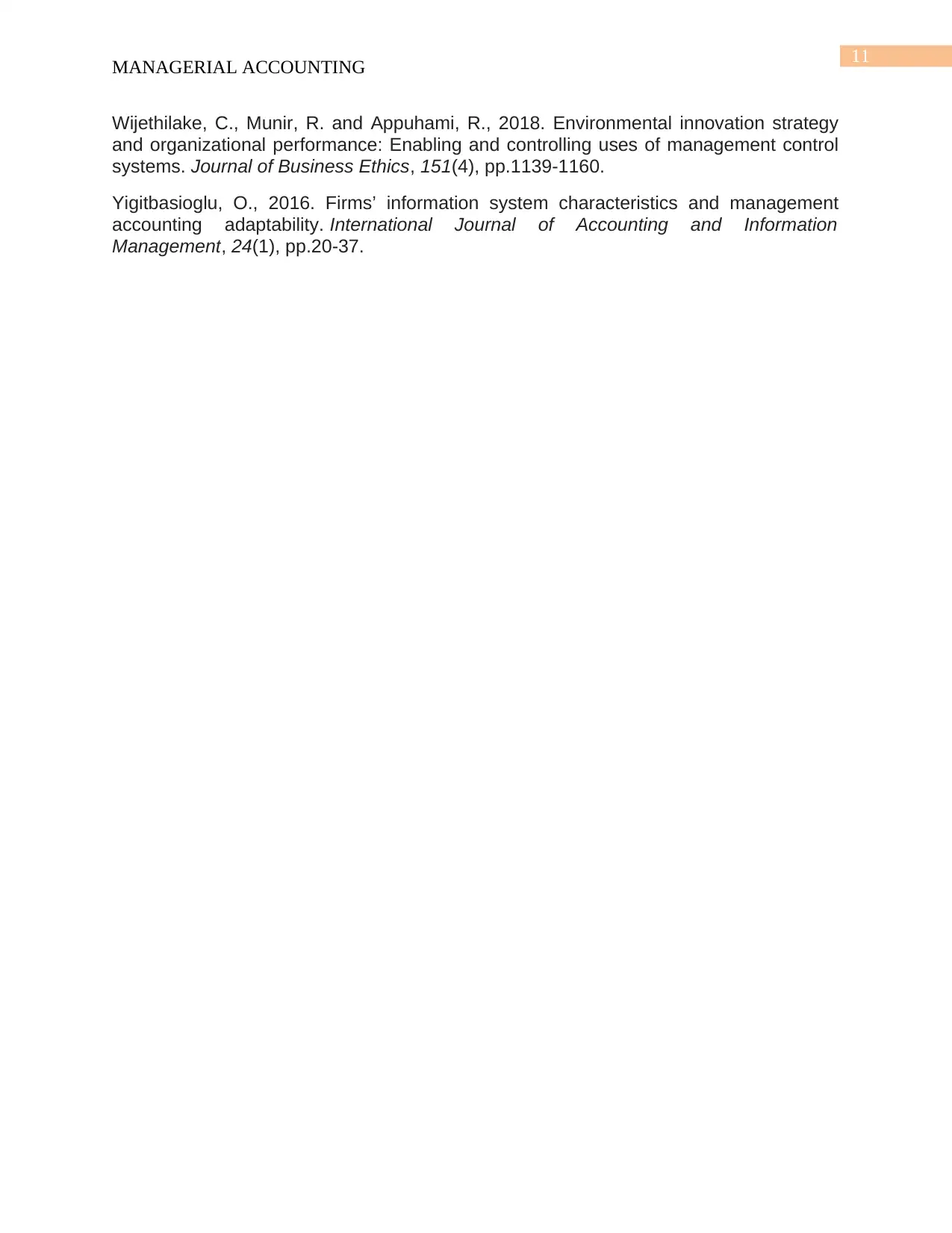
11
MANAGERIAL ACCOUNTING
Wijethilake, C., Munir, R. and Appuhami, R., 2018. Environmental innovation strategy
and organizational performance: Enabling and controlling uses of management control
systems. Journal of Business Ethics, 151(4), pp.1139-1160.
Yigitbasioglu, O., 2016. Firms’ information system characteristics and management
accounting adaptability. International Journal of Accounting and Information
Management, 24(1), pp.20-37.
MANAGERIAL ACCOUNTING
Wijethilake, C., Munir, R. and Appuhami, R., 2018. Environmental innovation strategy
and organizational performance: Enabling and controlling uses of management control
systems. Journal of Business Ethics, 151(4), pp.1139-1160.
Yigitbasioglu, O., 2016. Firms’ information system characteristics and management
accounting adaptability. International Journal of Accounting and Information
Management, 24(1), pp.20-37.
⊘ This is a preview!⊘
Do you want full access?
Subscribe today to unlock all pages.

Trusted by 1+ million students worldwide
1 out of 12
Related Documents
Your All-in-One AI-Powered Toolkit for Academic Success.
+13062052269
info@desklib.com
Available 24*7 on WhatsApp / Email
![[object Object]](/_next/static/media/star-bottom.7253800d.svg)
Unlock your academic potential
Copyright © 2020–2026 A2Z Services. All Rights Reserved. Developed and managed by ZUCOL.





